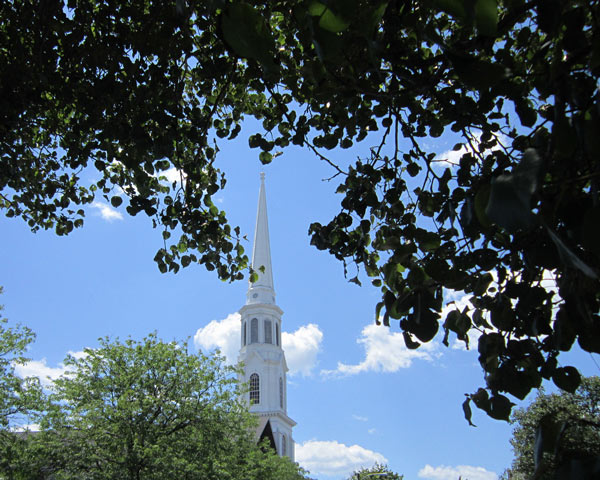
A
ccording to conventional wisdom, the influence of religion is steadily declining in American society. A 2013 Gallup poll determined that 77 percent of Americans think that religion “is losing its influence” in the United States. Certain commentators have partly attributed this trend to the rise of atheism. Bill Maher, the talk show host and comedian, illustratively argued that the share of Americans who “do not believe in any religion” and are “either agnostic or atheist is approaching 15 percent.” While Maher’s skepticism of religious dogma is often thought-provoking, it is doubtful that atheism has surged to such levels in America, where religion continues to carry considerable influence compared to other Western countries like Canada, France, Germany, and the United Kingdom.
The recurrent claim about atheism’s rise can largely be traced to a prominent study by the Pew Center, which found that the share of Americans without a religious affiliation rose from 15.3 to 19.6 percent between 2007 and 2012. The figure of 19.6 percent was logically reached by adding the 2.4 percent of Americans who are atheists, 3.3 percent agnostics, and 13.9 percent “nothing in particular.” However, the study also found that many among the last category do not believe in organized religion but still believe in God and prayer. In fact, a full 68 percent of the unaffiliated had faith in God.
Between a third and half of Americans reject the theory of evolution in favor of Genesis-based creationism. Such a proportion of creationists is extraordinarily high by international standards.
A recent Harris poll had even more striking results, as it found that 12 percent of Americans do not believe in God and that 14 percent are unsure if they do, thereby suggesting that up to 26 percent might be non-believers. But that finding seems high in comparison to prior polls. The aforesaid Pew study found that atheists and agnostics comprise 5.7 percent of Americans. According to another poll by WIN/Gallup, 5 percent of Americans are “convinced atheists.”
In other words, atheism does not appear to have made a huge surge in the United States, especially compared to other developed countries. The Eurobarometer poll notably indicates that, next to Americans, Europeans are far more likely to believe in a vague spirit or life force rather than in a definite personal god. Further, the average number of Europeans who believe in neither higher power is 20 percent, compared to 9 percent for Americans according to Gallup.
Intense religiosity continues to be a defining trait of American society, as demonstrated by the resilient influence of Christian fundamentalism. Between a third and half of Americans reject the theory of evolution in favor of Genesis-based creationism. Such a proportion of creationists is extraordinarily high by international standards.
The gap between Americans who accept evolution and those who reject it epitomizes the societal divide over a broad range of “culture war” issues, from access to basic contraception to apocalyptic Biblical prophecies. This polarization is often thought of as a conflict between religious and non-religious Americans. In reality, the divide is mainly among people of faith.
America is largely polarized between citizens who share liberal-moderate faiths and those who lean towards Christian fundamentalism, whereas non-believers remain a limited group. In comparison, the religious contrast in most other Western countries mainly pits liberal-moderate believers against a sizeable group of non-believers. Christian fundamentalism is either absent or significantly less influential in European nations, Canada, Australia, and New Zealand than in America.
It must be noted that many Americans are increasingly skeptical of fundamentalist morality. But this debate has largely been about opposite conceptions of religious tolerance among diverse people of faith—not necessarily about religion or irreligion per se.
This difference between America and other countries is at times overshadowed by events like the large protests against gay marriage that divided Paris in 2013. But leaving gay rights aside, French religious conservatives tend to have far more liberal stances than their American counterparts on most other “culture war” issues, such as evolution, Biblical prophecies, abstinence-only sexual education, and reproductive rights. In fact, there is no “culture war” over such issues in France and nearly all other European nations. Even on gay rights, European conservatives have often taken a much softer stance than American conservatives, who have distinguished themselves by vehemently supporting “Don’t Ask, Don’t Tell” and by banning both same-sex marriage and civil unions in multiple states.
It must be noted that many Americans are increasingly skeptical of fundamentalist morality, as illustrated by growing support for gay marriage and civil unions even in conservative states like Utah. But this debate has largely been about opposite conceptions of religious tolerance among diverse people of faith—not necessarily about religion or irreligion per se.
What still sets modern America apart from other Western countries is not simply its greater religiosity but its polarization over different types of religious beliefs. Liberal-moderate Christians like Barack Obama, who regularly invokes God in his speeches, tend to have sharply distinct religious views from Christian fundamentalists. Conflicting understandings of religion have contributed to the intense division of American society, not only during the Obama presidency, but also in the days when his predecessor George W. Bush represented the Americans sharing a more hard-line approach to faith.
At a time when religion is losing its social and political influence throughout much of the Western world, America stands apart due to its enduring faith in faith. Yet, faith paradoxically is at least as great a source of division as of unity in American society.
